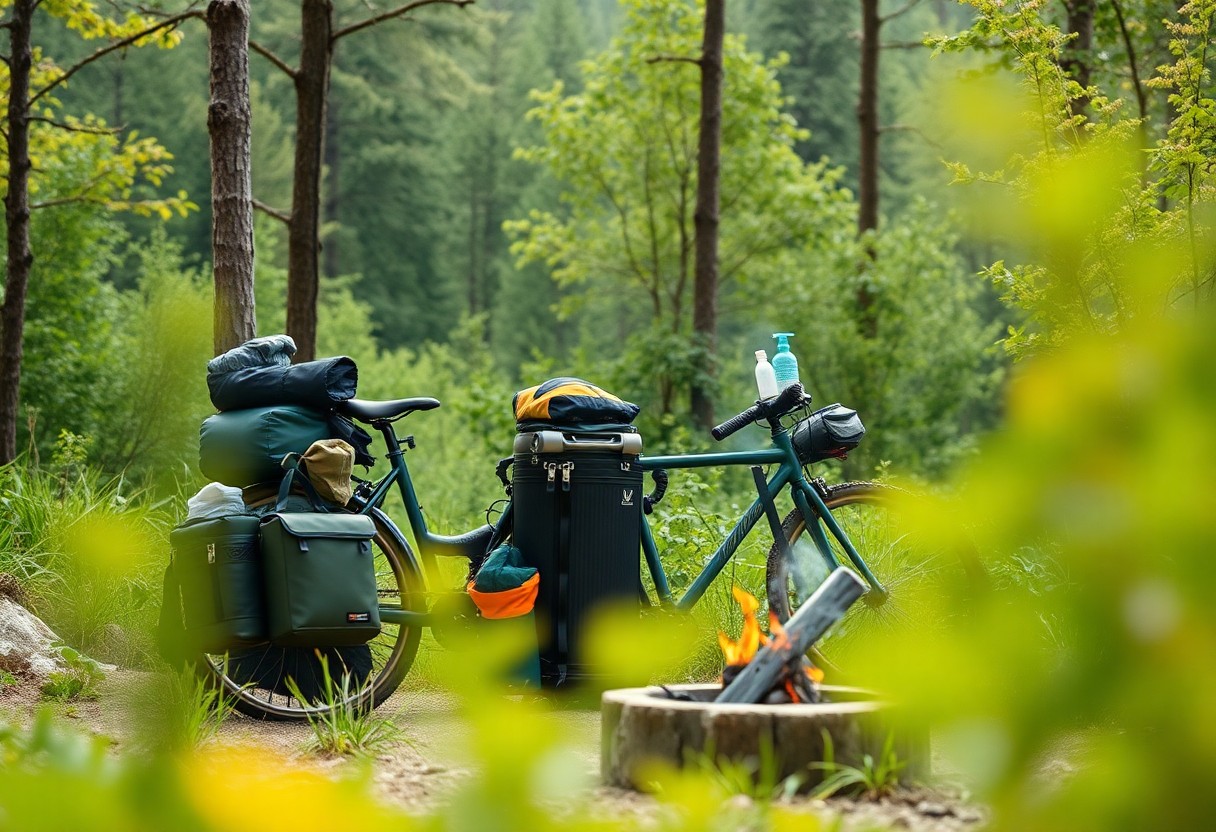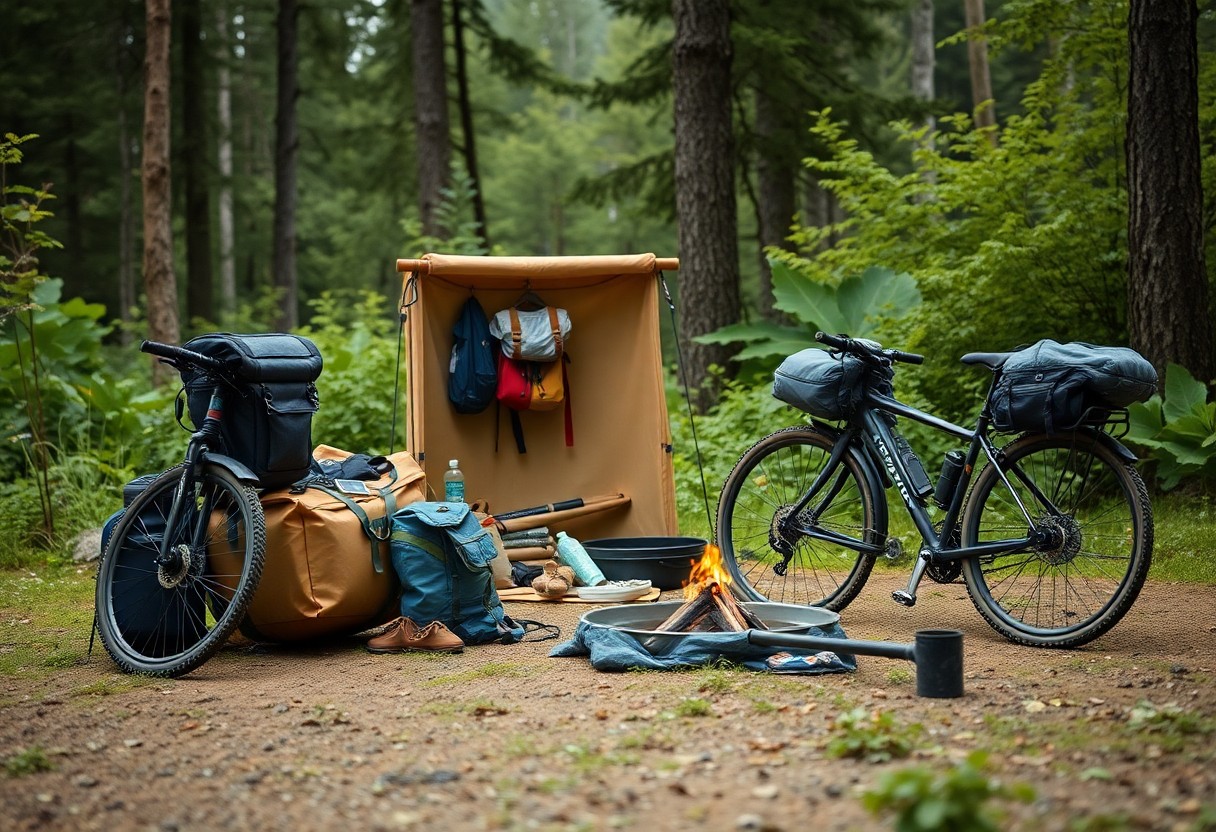With the right strategies, you can maintain good hygiene on multi-day bikepacking tours, ensuring you feel refreshed and healthy. This is especially important as dirt and sweat can lead to skin irritations and infections. In this blog post, I’ll share practical tips that will help you stay clean while navigating the great outdoors. From efficient washing techniques to choosing the right gear, these insights will keep you and your body in top condition during those thrilling adventures.
The Essentials of Personal Hygiene on the Road
Maintaining personal hygiene during multi-day bikepacking tours is necessary not just for comfort, but also for your health. Implementing a few simple strategies can ensure you stay fresh and clean while tackling the open road. Frequent handwashing, using biodegradable products, and staying mindful of waste disposal are some fundamental practices to consider as you navigate your journey.
Prioritising Cleanliness When Packing
Pack your necessarys with cleanliness in mind, ensuring you include items that promote hygiene. Always set aside a dedicated pouch for your toiletries, containing travel-sized products like biodegradable soap, a quick-dry towel, and toothbrush necessarys. Consider light-weight items that fit easily within your gear, allowing easy access when you need to freshen up.
Tools and Products for Minimalist Hygiene
Selecting the right tools and products for a minimalist approach means focusing on efficacy and space-saving design. Invest in a compact, multi-use soap that works for both body and laundry, along with a portable toilet kit. Ultralight wet wipes and a small hand sanitiser can also provide a quick clean-off purpose without taking up much room in your bags.
By simplifying, you can ensure all hygiene products serve multiple purposes, reducing bulk while enhancing your ability to stay clean on the road. For instance, a solid shampoo bar doubles as soap, and a collapsible wash bowl can serve various functions, from washing dishes to personal cleansing. As such, prioritising quality over quantity in your hygiene kit can provide you with the tools you need without weighing you down.
Creative Solutions for Water Management
Effectively managing your water supply can greatly enhance your bikepacking experience. By utilising a combination of local water sources and filtration techniques, you’ll ensure that you stay hydrated while minimising waste. Carrying a lightweight water filter or purification tablets can provide peace of mind, allowing you to refill your water supply from rivers, streams, or lakes without compromising on safety.
Finding and Filtering Water Sources
Scouting for water sources beforehand can save you significant hassle on the road. Use apps or maps that highlight natural water bodies along your route. Once you find a source, employ a reliable filter, like a portable water filter or UV steriliser, to eliminate potential contaminants and ensure clean drinking water.
Eco-Friendly Practices for Waste Disposal
Taking proper measures for waste disposal is vital to maintaining the environment’s integrity. Always collect your waste, including hygiene products like wipes and wrappers, and consider using biodegradable alternatives when possible. Dispose of anything non-biodegradable responsibly by carrying it to the nearest waste facilities.
Implementing eco-friendly waste disposal practices on your bikepacking trips involves careful planning. Use *compostable* bags for any personal waste, especially if you have a larger group. In areas without facilities, create a small *travel toilet* using buried waste techniques, ensuring it’s at least 6-8 inches deep and 200 feet away from water sources. This minimal impact approach not only helps preserve the environment but also promotes responsible camping that others can follow.
Strategies to Combat Odours and Maintain Freshness
Odour management during long rides requires a thoughtful approach. Incorporating fabric technologies that wick moisture and dry quickly can be transformative. Using breathable materials in your clothing not only enhances comfort but also assists in reducing persistent smells. Consider packing travel-sized odour eliminators or even imperative oils to spritz your gear, offering a refreshing scent while you ride. Coupling these techniques with regular body care steps can keep you feeling fresh throughout your adventure.
Clothing Choices for Long-Distance Cycling
Selecting the right clothes is paramount for long-distance cycling. Opt for moisture-wicking fabrics that allow sweat to escape while keeping you dry. Look for items with built-in odour resistance, such as merino wool, which naturally combats smells. Layering also helps, as you can adapt your clothing to varying temperatures, ensuring you maintain comfort without accumulating excess sweat.
Refreshing Techniques Without a Shower
In the absence of a shower, there are several effective techniques to revitalise yourself after a long day of cycling. Using biodegradable wet wipes or moistened towelettes can help cleanse your skin and reduce odour. Additionally, a quick rinse with a water bottle can refresh your face and neck, which are common areas for sweat accumulation. Carrying a small cloth or towel for patting down sweaty areas can also make a noticeable difference.
Creating a personalised hygiene kit can significantly impact your comfort during bikepacking. Include items such as a bandana that can be soaked in cold water and used as a cooling neck wrap. Incorporating a small portable misting spray with water and imperative oil can freshen up your body and gear throughout the day. These simple but effective methods will help you feel revitalised and ready for the next leg of your journey, ensuring you enjoy every moment of your adventure.

Mental Health and Cleanliness: A Personal Perspective
Staying clean during multi-day bikepacking tours significantly impacts your mental well-being. The connection between personal hygiene and mood can be profound; feeling dirty often leads to feelings of discomfort and unease, which can dampen your overall enjoyment of the adventure. By prioritising cleanliness, you foster a sense of control and comfort, allowing you to focus more on the journey ahead and less on the distractions of discomfort.
The Psychological Benefits of Staying Clean
Cleaning up after a long day on the bike crucially refreshes your state of mind. Engaging in simple hygiene practices can elevate your mood and restore energy levels. When you feel fresh, you’re more likely to embrace the day’s challenges and enjoy the scenery instead of being stuck in your head, ruminating over minor irritations.
Creating a Routine that Works for You
Establishing a reliable routine is crucial for maintaining hygiene on the road. Determine specific times for cleaning up, whether it’s morning or evening, that fit seamlessly into your bikepacking schedule. Incorporating hygiene activities into your daily rituals can transform what may feel like chore into a consistent part of your adventure, reinforcing both cleanliness and mental clarity.
To create a routine that truly works for you, consider the duration of your rides and your available resources. For instance, you might designate a ‘refresh time’ after lunch when you can take a short break to wash your face and hands, or perhaps set aside a few minutes before bed to clean your feet and change into fresh socks. Tailor these rituals to match your ride’s intensity and terrain, ensuring that they enhance rather than interrupt your flow. Finding what suits you—a quick wash with biodegradable wipes on the trail or a brisk rinse in a nearby stream—will lead to a comfortable balance between adventure and self-care.
Maintenance of Gear and Equipment Hygiene
Ensuring the hygiene of your gear and equipment plays a vital role in your overall experience on multi-day bikepacking tours. Regular maintenance can prevent unpleasant odours and bacterial growth, which contribute to an uncomfortable environment. Keep your equipment clean by establishing a routine of checking and washing items, especially after long days on the trail. Storing your kit correctly when not in use also helps inhibit the growth of unwanted microbes, resulting in a fresher setup for your next adventure.
Cleaning Strategies for Your Bike and Accessories
To maintain your bike and accessories in top condition, incorporate a simple cleaning routine into your daily schedule. After each ride, wipe down your frame and components with a damp cloth to remove mud and grime. Use a gentle brush to clean moving parts like the chain and derailleurs. For deeper cleaning, consider using a biodegradable degreaser every few days. Bear in mind, keeping the chain lubricated not only improves performance but also extends the life of your bike.
Preventing Bacterial Growth in Camping Gear
Ensure your camping gear stays free from bacterial growth by following a few best practices. After each use, always air out your tent, sleeping bag, and other fabric items, allowing them to dry completely before storing. Utilise breathable storage bags to prevent moisture build-up. Regularly wash your cooking utensils and plates with hot water and soap, and ensure everything is thoroughly dried before packing away. This proactive approach significantly reduces bacteria proliferation, ensuring a healthier camping environment.
Taking additional steps can further prevent bacterial growth in your camping gear. Consider using antibacterial sprays or wipes on the surfaces of your food containers and cooking utensils. If you’re using a tent, opt for one with moisture-wicking properties that allow condensation to escape. Also, using a ground tarp beneath your sleeping bag can prevent moisture from the ground seeping in. By incorporating these preventive measures, you not only minimise bacterial presence but also enhance the lifespan of your gear, making your camping experience much more enjoyable.
Summing up
So, to maintain cleanliness during your multi-day bikepacking tours, you can implement a few effective strategies. Prioritising lightweight and compact hygiene products will keep your pack manageable, while establishing a routine for washing your hands and face regularly helps you feel fresh. Using biodegradable soap is an excellent choice for campsite cleanliness, and quick-drying fabrics can minimise odours. Also, try to find opportunities for a proper wash when you can, whether at campsites or local facilities. By staying organised and proactive about your hygiene, you’ll enhance your overall experience on the trails.
